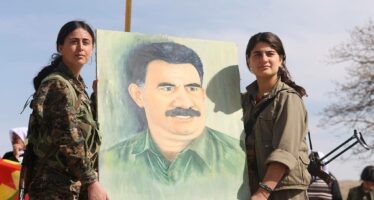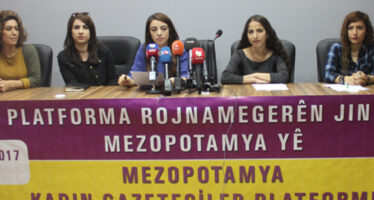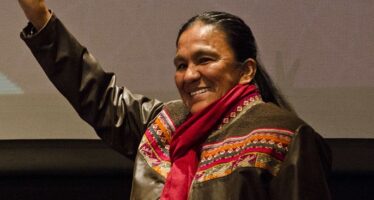Cambodia: Sex Workers Face Unlawful Arrests and Detention
![]()

Cambodian sex workers stage a protest against a police crackdown on prostitution. Sex workers report that police physically and sexually abuse them in custody. © 2008 AP Photo
(Phnom Penh) – The Cambodian government should act quickly to end violence against sex workers and permanently close the government centers where these workers have been unlawfully detained and abused, Human Rights Watch said in a new report released today. Human Rights Watch also urged the Cambodian government to suspend provisions in the 2008 Law on Suppression of Human Trafficking and Sexual Exploitation that facilitate police harassment and abuses.
Human Rights Watch’s 76-page report, “Off the Streets: Arbitrary Detention and Other Abuses against Sex Workers in Cambodia,” is based on more than 90 interviews and group discussions with female and transgender sex workers in Phnom Penh, Battambang, Banteay Meanchey, and Siem Reap. It describes how sex workers face a wide range of abuses, including beatings, extortion, and rape at the hands of authorities, particularly in Phnom Penh.
“For far too long, police and other authorities have unlawfully locked up sex workers, beaten and sexually abused them, and looted their money and other possessions,” said Elaine Pearson, acting Asia director at Human Rights Watch. “The Cambodian government should order a prompt and thorough independent investigation into these systematic violations of sex workers’ human rights and shut down the centers where these people have been abused.”
Police arrest sex workers in regular sweeps on the streets and parks of Phnom Penh. Some of the violence is opportunistic, while other abuses commonly occur in periodic crackdowns and raids by police and district authorities, at times targeting sex workers specifically and other times picking up sex workers along with other groups of marginalized people on the streets.
Police abuse sex workers with impunity. Sex workers told Human Rights Watch that police officers beat them with their fists, sticks, wooden handles, and electric shock batons. In several instances, police officers raped sex workers while they were in police detention. Every sex worker that Human Rights Watch spoke to had to pay bribes or had money stolen from them by police officers.
A 2008 Cambodian law on trafficking and sexual exploitation criminalized all forms of trafficking, including forced labor. Human Rights Watch found that police officers at times can use those sections of the law that criminalize “solicitation” and “procurement” of commercial sex to justify harassment of sex workers. The provisions are also broad enough that they can be used to criminalize advocacy and outreach activities by sex worker groups and those who support them.
Human Rights Watch urged the Cambodian government to consult with sex worker groups, United Nations agencies, and organizations working on human rights, trafficking, and health to review and address the impact on the human rights of those engaged in sex work of provisions in the 2008 law on trafficking and sexual exploitation, before implementing those provisions.
“In an environment where police already act with impunity, the Cambodian government needs to recognize that criminalizing soliciting is a recipe for continuing human rights abuse,” said Pearson. “The government should go back to the drawing board – starting first by consulting extensively with sex workers and other groups – before continuing to implement the provisions which have been abused by police.”
In Phnom Penh, police refer sex workers to the municipal Office of Social Affairs and from there to NGOs or the government Social Affairs center, Prey Speu. Conditions in Prey Speu are abysmal. Sex workers, beggars, drug users, street children, and homeless people held at Prey Speu have reported how staff members at the center have beaten, raped, and mistreated detainees, including children. Local human rights workers, citing eyewitness accounts, allege that at least three people, and possibly more, were beaten to death by guards at Prey Speu between 2006 and 2008.
Following advocacy by Cambodian and international organizations, in 2009 and 2010 the municipal Social Affairs office began sending most sex workers picked up in sweeps to the custody of nongovernmental organizations (NGOs) rather than Prey Speu. However, since May 2010, at least eight sex workers have been detained there. Sex workers detained in Prey Speu in June 2010 were locked in their rooms, only allowed to leave their rooms to bathe twice a day in dirty pond water, or, accompanied by a guard, to go to the toilet.
Human Rights Watch called on the Cambodian government to permanently close Social Affairs centers such as Prey Speu where people are being unlawfully detained. In a January 2010 report, “Skin on the Cable,” Human Rights Watch also documented horrific abuses at drug detention facilities in Cambodia against people who use drugs. The Cambodian government should also establish a special commission to investigate abuses thoroughly and independently, and hold the perpetrators accountable. So far, police and other authorities have evaded accountability for these abuses.
“The Cambodian government should immediately and permanently close down detention centers such as Prey Speu where people are being unlawfully detained, beaten up, and abused,” said Pearson. “Prosecuting those who commit these crimes will send a strong message that abuses against sex workers are not tolerated.”
Donors supporting anti-trafficking efforts and police training, especially the US, Australia, Japan, the European Union, and the UN, should review funding to the police and Ministry of Social Affairs until there is a full independent investigation into allegations of abuses and prosecutions of those found responsible and the Social Affairs centers such as Prey Speu are permanently closed. Despite years of training for police, police abuses continue, even by units that have been trained with international donor support, such as specialized anti-trafficking police units.
“Donors should not spend their money on training abusive officials, but instead take steps that will promote accountability from the Cambodian government,” said Pearson.
Testimony from sex workers in “Off the Streets”
Neary, a male-to-female transgender sex worker described being tortured by police:
“Three police officers beat me up seriously at Wat Phnom commune police station after I was taken from the park. One of the police officers pointed his gun at my head and pulled the trigger, but the bullet did not fire. They kicked my neck, my waist, and hit my head and my body with a broom stick. It lasted about half an hour. I begged them not to beat me. The police officers were cruel and they did not tell me any reason why they did this to me. “
Twenty-year-old Tola described how police extort money from sex workers:
“At the [Daun Penh district] police station, police asked us if I have a “me-ka” [manager]. Police allowed me and other sex workers to call our me-kas to come pay the lous [bribe] in exchange for our release. Fifteen out of 20 [sex workers] were released after their managers came to pay the police. The rest of us were kept at the police station for three days before being sent to the Social Affairs office and then an NGO shelter.”
Srey Pha, age 27, described her experience at Prey Speu:
“[Prey Speu] was like hell. I was among 30 people in one locked room of men, women, and children. No toilet in the room, but two buckets served as toilet for all of us to share. There were blood stains all over the walls. I could not sleep at night as I was so scared and worried. I received little food to eat in two meals per day – rice with Prahok (fermented fish paste) and some tamarind. No plate or spoon, I had to eat from a plastic bag. At night, the guard seriously beat up a man who tried to escape.”
Nika, age 28, describes a beating by municipal park security guards:
“First one guard came and kicked me and said, “Why?” Then three other guards came. Two guards held my arms while the other two beat me. They slapped me in the face. They seemed a bit drunk. They beat me with bamboo sticks and their radio on my head and all over. They ripped my clothes. The police came by, but they didn’t do anything. The guards continued to beat me for almost half an hour. Many people saw, but everyone was too scared to intervene. The head of the security told the other guard if they see me there again, they should beat me to death.”
Related Articles
ABDULLAH ÖCALAN NOMINATED FOR SYDNEY PEACE PRIZE
![]()
Abdullah Öcalan, imprisoned head of the Kurdistan Workers Party (PKK) has been nominated for the Sydney Peace Prize
SETA report targets journalists, said Mesopotamia Women Journalists Platform
![]()
We publish the the written statement issued by the Mesopotamia Women Journalists Platform about the SETA report
La líder social argentina Milagros Salas condenada a 13 años de prisión
![]()
Como si fuese la crónica de una condena anunciada la dirigente social e indígena argentina Milagros Salas fue finalmente condenada a 13 años de cárcel en su cuarto proceso consecutivo




